[2007] 1 SLR(R) 629 - Singapore Law
[2007] 1 SLR(R) 629 - Singapore Law
[2007] 1 SLR(R) 629 - Singapore Law
You also want an ePaper? Increase the reach of your titles
YUMPU automatically turns print PDFs into web optimized ePapers that Google loves.
672 SINGAPORE LAW REPORTS (REISSUE) [<strong>2007</strong>] 1 <strong>SLR</strong>(R)<br />
continue to bear the meaning which upon its true construction in the<br />
light of the relevant surrounding circumstances it bore at that time.<br />
It is therefore open to argument in a future case whether in the context of<br />
the political and commercial conditions existing in <strong>Singapore</strong> in 1878, the<br />
legislature of the Straits Settlements had intended s 4(10) to give power to<br />
the court to grant interlocutory injunctions in aid of foreign court<br />
proceedings, or even less likely in aid of foreign arbitral proceedings. Unlike<br />
in England where legislative and policy developments since the 1980s<br />
appeared to have influenced the courts in their interpretation of s 37(3) of<br />
the English 1981 Act (which has no equivalent in <strong>Singapore</strong>), there has been<br />
no such development in <strong>Singapore</strong> in relation to s 4(10) of the CLA as a<br />
source of statutory authority in relation to Mareva injunctions in aid of<br />
foreign proceedings until the enactment of the IAA. Given that Parliament<br />
ignored s 4(10) of the CLA entirely when it enacted the IAA to provide a<br />
new statutory framework for international arbitrations in <strong>Singapore</strong>, a<br />
court would need to know why it was necessary to enact s 12(7) of the IAA<br />
if the court had power under s 4(10) to grant Mareva relief in aid of foreign<br />
arbitrations. Perhaps it was simply a case of Parliament’s attention not<br />
having been drawn to the need to provide a broader framework to deal with<br />
interim measures to assist foreign proceedings, whether court or arbitral<br />
proceedings.<br />
95 Finally, it may be useful to refer to the approach of the Court of<br />
Appeal of the Bahamas in a similar situation concerning the power of a<br />
Bahamas court to grant a Mareva injunction in aid of foreign court<br />
proceedings where the plaintiff did not have a pre-existing cause of action.<br />
In Meespierson (Bahamas) Limited v Grupo Torras SA (1999–2000)<br />
2 ITELR 29, the court had to consider scope of s 21(1) of the Supreme<br />
Court Act (Bahamas) which was modelled verbatim on s 37(1) of the<br />
English 1981 Act (and which Ang J had held to be materially similar,<br />
although differently worded from s 4(10) of the CLA). However, when the<br />
Bahamas Parliament enacted s 21(1), it omitted to enact s 37(3) of the<br />
English 1981 Act (which as we have stated earlier conferred statutory power<br />
on the court to grant Mareva injunctions against foreign residents). In the<br />
High Court, the Chief Justice held that s 21(1) empowered her to grant a<br />
free-standing injunction. The Court of Appeal unanimously overruled her<br />
and decided that it was bound by the decision of the Privy Council which<br />
applied The Siskina on the power of the court under s 37(1) of the English<br />
1981 Act. The President of the Court of Appeal, in his judgment, said (at 34,<br />
35 and 38):<br />
It is trite that the The Siskina approach to the Mareva injunction has<br />
held sway in subsequent cases in English and Commonwealth courts<br />
without departure from the underlying pre-supposition of there being<br />
an existing cause of action for which relief is claimed in substantive<br />
proceedings brought in the jurisdiction. There have been significant<br />
English statutory developments which impinge on Mareva relief,


![[2007] 1 SLR(R) 629 - Singapore Law](https://img.yumpu.com/7082457/44/500x640/2007-1-slrr-629-singapore-law.jpg)
![[2011] 1 SLR 727 - Singapore Law](https://img.yumpu.com/51140774/1/166x260/2011-1-slr-727-singapore-law.jpg?quality=85)
![[1983-1984] SLR(R) 447 - Artic Builders & Co - Singapore Law](https://img.yumpu.com/50909204/1/164x260/1983-1984-slrr-447-artic-builders-co-singapore-law.jpg?quality=85)
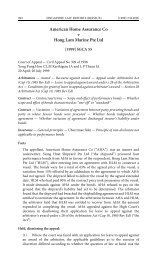
![[1996] 2 SLR(R) 292 - Lim Eng Hock Peter v ... - Singapore Law](https://img.yumpu.com/47482222/1/164x260/1996-2-slrr-292-lim-eng-hock-peter-v-singapore-law.jpg?quality=85)
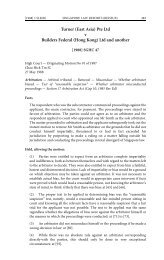
![[2006] 1 SLR(R) 197 - PT Asuransi Jasa Indonesia - Singapore Law](https://img.yumpu.com/46425352/1/164x260/2006-1-slrr-197-pt-asuransi-jasa-indonesia-singapore-law.jpg?quality=85)
![[1985-1986] SLR(R) 503 - Woh Hup (Pte) - Singapore Law](https://img.yumpu.com/45676364/1/164x260/1985-1986-slrr-503-woh-hup-pte-singapore-law.jpg?quality=85)
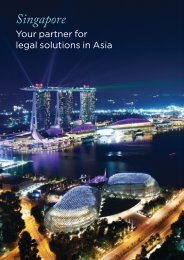
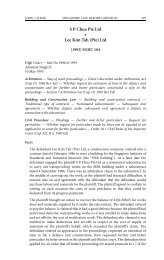
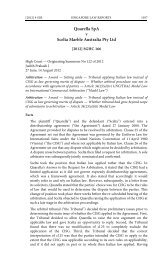
![[2010] 2 SLR 821 - Singapore Law](https://img.yumpu.com/43145563/1/166x260/2010-2-slr-821-singapore-law.jpg?quality=85)
![[2007] 1 SLR(R) 597 - PT Asuransi Jasa Indonesia - Singapore Law](https://img.yumpu.com/42983489/1/164x260/2007-1-slrr-597-pt-asuransi-jasa-indonesia-singapore-law.jpg?quality=85)
![[1989] 1 SLR(R) 433 - Singapore Law](https://img.yumpu.com/42649524/1/164x260/1989-1-slrr-433-singapore-law.jpg?quality=85)
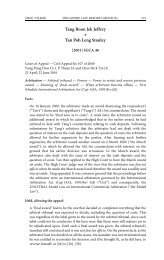
![[1997] 3 SLR(R) 360 - Singapore Law](https://img.yumpu.com/42287507/1/164x260/1997-3-slrr-360-singapore-law.jpg?quality=85)